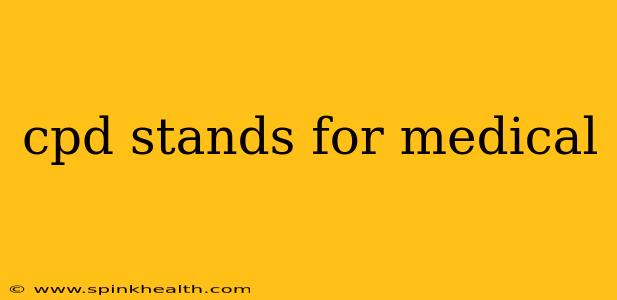Decoding CPD: Understanding Continuous Professional Development in Medicine
The medical field is a dynamic landscape, constantly evolving with new research, treatments, and technologies. Staying current isn't just beneficial; it's essential for providing the best possible patient care. This is where CPD, or Continuous Professional Development, steps in. But what exactly does CPD stand for in a medical context, and why is it so crucial? Let's unravel this.
In the medical world, CPD doesn't stand for a single, specific medical condition. Instead, it's an acronym representing Continuous Professional Development, a commitment to ongoing learning and skill enhancement throughout a healthcare professional's career. It's not a passive process; it's an active engagement in improving one's knowledge, skills, and professional performance. Think of it as a lifelong learning journey, specifically tailored to the demands of the medical profession.
This journey isn't just about accumulating certificates; it's about transforming knowledge into practical, patient-centered skills. It's about refining judgment, embracing innovation, and ensuring that medical professionals consistently provide the highest quality of care.
What are the different types of CPD activities for medical professionals?
The possibilities for CPD are vast and varied, catering to the diverse needs and specialties within medicine. Here are some common activities:
-
Conferences and Workshops: Attending conferences and workshops provides opportunities to hear from leading experts, network with colleagues, and learn about the latest breakthroughs. Imagine a cardiologist attending a conference on the newest minimally invasive heart surgery techniques, instantly enhancing their ability to offer patients the most advanced options.
-
Journal Articles and Research Papers: Staying up-to-date with medical literature is vital. Reading and critically evaluating research papers allows professionals to incorporate the most current evidence into their practice. A family physician reviewing a recent study on diabetes management can refine their approach to patient care, providing more effective and personalized plans.
-
Online Courses and Webinars: Online platforms offer a wealth of educational resources, allowing for flexible and convenient learning. Anesthesiologists might utilize online courses to delve deeper into the latest advancements in pain management techniques.
-
Mentorship and Shadowing: Learning from experienced professionals is invaluable. Mentorship programs and shadowing opportunities provide hands-on experience and guidance, accelerating professional growth. A young surgeon shadowing a renowned specialist gains practical experience and insights that textbooks can't replicate.
-
Case Studies and Peer Review: Analyzing complex cases and engaging in peer review allows medical professionals to critically evaluate their own practice and learn from their colleagues' experiences. This collaborative learning environment fosters a culture of continuous improvement.
Why is CPD important for medical professionals?
The importance of CPD in medicine cannot be overstated. It directly impacts:
-
Patient Safety: Staying current with best practices and advancements minimizes risks and improves patient outcomes.
-
Professional Competence: Continuous learning ensures medical professionals remain competent and capable of handling the complexities of modern medicine.
-
Career Advancement: CPD enhances career prospects, opening doors to leadership roles and specialized opportunities.
-
Maintaining Licensure: Many medical licensing boards mandate a certain number of CPD credits for license renewal, highlighting the crucial role of ongoing professional development.
How often should medical professionals engage in CPD?
The frequency of CPD activities varies depending on the specific requirements of licensing bodies and individual professional goals. However, regular, consistent engagement is key – rather than sporadic bursts of activity. A proactive and integrated approach is essential for maintaining competency and staying abreast of the latest advancements.
In conclusion, while CPD doesn't stand for a specific medical condition, it represents a crucial commitment to continuous learning and professional growth within the medical profession. It's the cornerstone of providing high-quality patient care and ensuring the ongoing competence of healthcare professionals. It's a journey, not a destination, reflecting the ever-evolving nature of medicine itself.

